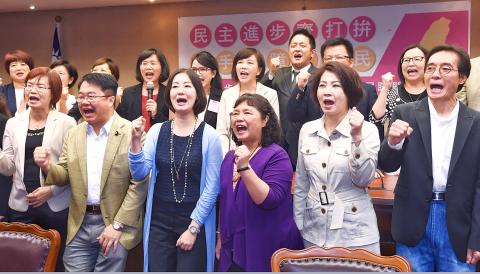The Democratic Progressive Party (DPP) caucus yesterday inaugurated a legislative organization to address issues facing immigrants, tap into international talent and create a friendlier living environment for new arrivals.
Forty-one DPP legislators joined the Immigrant Affairs Development Alliance, including Su Chiao-hui (蘇巧慧), whose constituency has the largest immigrant population in New Taipei City, which is the city with the most immigrants in Taiwan.
DPP caucus secretary-general Lee Chun-yi (李俊俋) said the establishment of the organization could unify and deepen the party’s interaction with immigrant communities to better understand their needs and turn their demands into law.

Photo: Liu Hsin-de, Taipei Times
Immigrants are most concerned about restrictions on visas and citizenship, and the DPP caucus would push to revise the Immigration Act (入出國及移民法) and the Nationality Act (國籍法) to lay a better legal framework for foreigners seeking residency or citizenship, he said.
DPP Legislator Su Chih-feng (蘇治芬) said one in 10 households in Yunlin County’s Taisi Township (台西) are immigrant households, which is reflected in social issues in the area — both positive and negative — that require government solutions.
Vietnamese children’s books have been imported to help children of immigrants learn their parents’ language, with language courses taught by people in the community being planned, Su said.
The organization has four divisions, which are to manage immigrant affairs in the north, center, south and east of the nation.
The organization complements the efforts of the DPP’s Immigrant Committee, which was established in February and headed mostly by immigrants of Southeast Asian descent who advise the party on policy.
“Immigrants have come to Taiwan to pursue their dreams. What they want is simple: to be treated equally and to make Taiwan their new home,” radio host and committee director Tran Thi Hoang Phuong said.
The government has made visible efforts on immigrant issues and there is hope for swift improvement with the establishment of the organization, Tran said.
The government has to harness the talents of immigrants and their children for successful implementation of the “new southbound policy,” which seeks to develop closer business and cultural ties with Southeast Asian countries, National Chi Nan University professor Kimyung Keng said.
Businesses attempting to establish a foothold in Southeast Asian countries are often thwarted by cultural and language barriers, while immigrants and their children have the linguistic and cultural capital to help them, said Keng, who is also a member of the committee.
With their knowledge of consumer behavior in Southeast Asian markets, Taiwanese of Southeast Asian descent can help businesses with localization efforts, Keng said, adding that he helped develop a mobile phone application to enable instantaneous translation for overseas Taiwanese business to capitalize on the linguistic resources immigrants bring to Taiwan.

Alain Robert, known as the "French Spider-Man," praised Alex Honnold as exceptionally well-prepared after the US climber completed a free solo ascent of Taipei 101 yesterday. Robert said Honnold's ascent of the 508m-tall skyscraper in just more than one-and-a-half hours without using safety ropes or equipment was a remarkable achievement. "This is my life," he said in an interview conducted in French, adding that he liked the feeling of being "on the edge of danger." The 63-year-old Frenchman climbed Taipei 101 using ropes in December 2004, taking about four hours to reach the top. On a one-to-10 scale of difficulty, Robert said Taipei 101

Nipah virus infection is to be officially listed as a category 5 notifiable infectious disease in Taiwan in March, while clinical treatment guidelines are being formulated, the Centers for Disease Control (CDC) said yesterday. With Nipah infections being reported in other countries and considering its relatively high fatality rate, the centers on Jan. 16 announced that it would be listed as a notifiable infectious disease to bolster the nation’s systematic early warning system and increase public awareness, the CDC said. Bangladesh reported four fatal cases last year in separate districts, with three linked to raw date palm sap consumption, CDC Epidemic Intelligence

US climber Alex Honnold left Taiwan this morning a day after completing a free-solo ascent of Taipei 101, a feat that drew cheers from onlookers and gained widespread international attention. Honnold yesterday scaled the 101-story skyscraper without a rope or safety harness. The climb — the highest urban free-solo ascent ever attempted — took just more than 90 minutes and was streamed live on Netflix. It was covered by major international news outlets including CNN, the New York Times, the Guardian and the Wall Street Journal. As Honnold prepared to leave Taiwan today, he attracted a crowd when he and his wife, Sanni,

Two Taiwanese prosecutors were questioned by Chinese security personnel at their hotel during a trip to China’s Henan Province this month, the Mainland Affairs Council (MAC) said yesterday. The officers had personal information on the prosecutors, including “when they were assigned to their posts, their work locations and job titles,” MAC Deputy Minister and spokesman Liang Wen-chieh (梁文傑) said. On top of asking about their agencies and positions, the officers also questioned the prosecutors about the Cross-Strait Joint Crime-Fighting and Judicial Mutual Assistance Agreement, a pact that serves as the framework for Taiwan-China cooperation on combating crime and providing judicial assistance, Liang